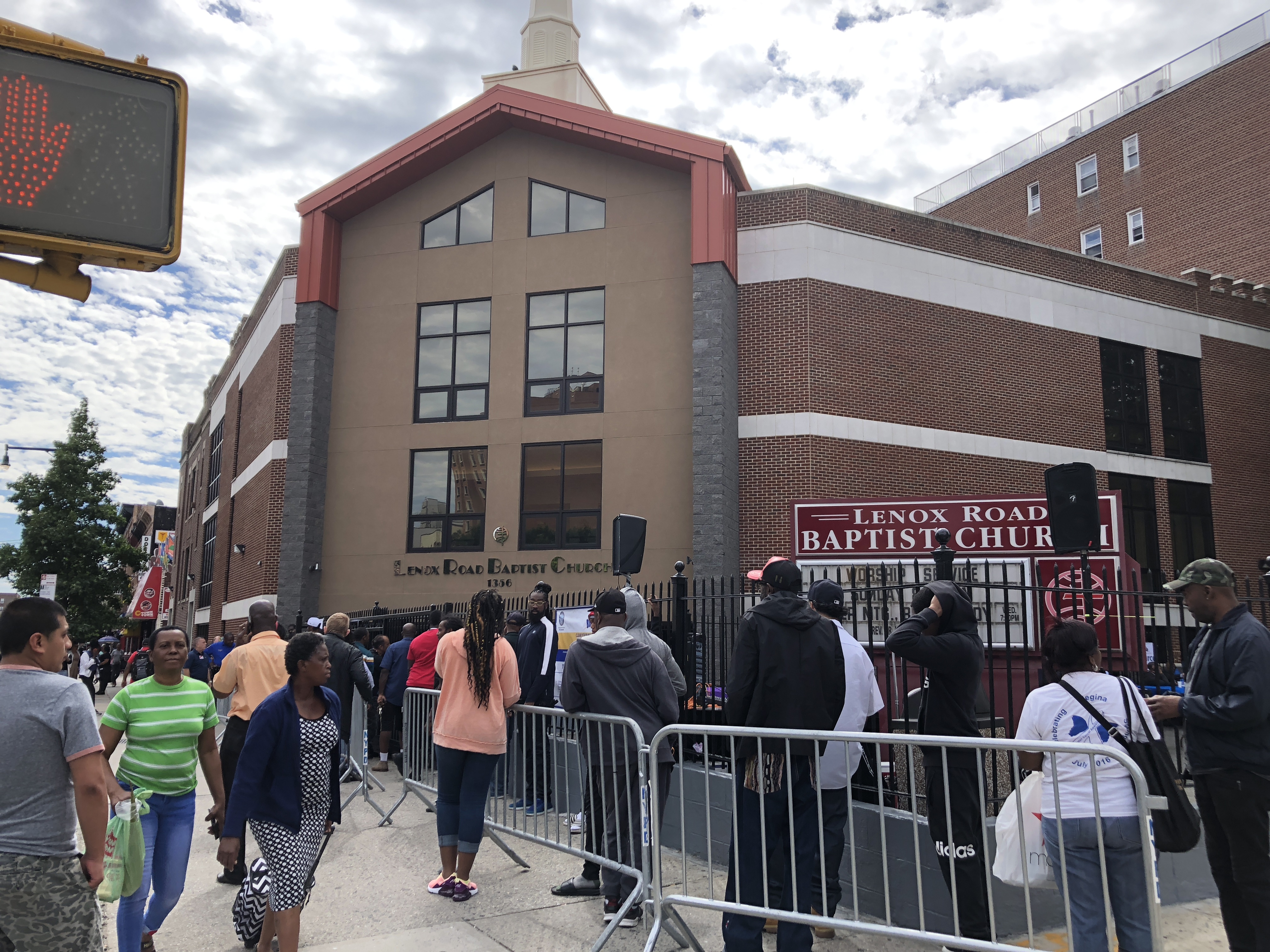“We are doing something that has never been done before in the State of New York,” Brooklyn District Attorney Eric Gonzalez told me, leaning in as gospel music plays outside of Lenox Baptist Church, where the latest iteration of the Brooklyn DA’s “Begin Again” event series was held on September 21 and 22. “Here, we are vacating all eligible low-level marijuana summons warrants and Brooklyn-based convictions.”
A collaboration between the Brooklyn DA’s office and The Legal Aid Society, among other organizations, “Begin Again” is an “easy option,” as the DA’s spokesperson Oren Yaniv said, that streamlines an otherwise time-consuming process to clear one’s criminal record.
Upon arrival, “Begin Again” participants find a place in the single-file line that wraps around the block of Nostrand Avenue and Lenox Road in the Flatbush neighborhood of Brooklyn. Volunteers greet attendees and confirm that they have identifying documentation, such as a license. Once inside, individuals consult with Legal Aid attorneys to ensure that their summonses or convictions are eligible to be heard. Next, participants move into a makeshift courtroom, where a judge considers the summons warrants. The judge then decides whether or not to clear their warrants and dispose of their cases.
.@LegalAidNYC providing legal assistance to participants at today’s Begin Again event. pic.twitter.com/4kAtWGBYZ8
— Eric Gonzalez (@BrooklynDA) September 21, 2018
“We cleared 138 summons warrants, received 56 petitions to vacate marijuana convictions and the DA moved to dismiss 3,146 marijuana summons warrants which the judge vacated and sealed,” Deputy Director of Communications Helen Peterson told Filter regarding the two-day event.
Just moved to vacate 3,146 summons warrants for low-level marijuana offenses in the interest of justice. #BeginAgain #cjreform pic.twitter.com/oF9gZrnsT4
— Eric Gonzalez (@BrooklynDA) September 21, 2018
On September 12, Manhattan District Attorney Cyrus R. Vance, Jr. also moved to dismiss all “3,042 marijuana smoking and possession cases” that were available in the office’s records dating back to 1978.
Prior to the Brooklyn DA’s September event at Lenox Baptist Church, the “Begin Again” initiative, started by former District Attorney Ken Thompson, hosted a total of five clinics between 2015 and 2017. “Over 3,000 New Yorkers Attended, [and] Over 2,100 Warrants Cleared in First Five Events,” reported the program’s website.
“Begin Again” seeks “to help numerous individuals who have been victimized by the crackdown on low-level offenses,” Public Advocate (and Democratic candidate for Attorney General) Letitia James said. In light of the mistreatment most attending individuals have experienced at the hands of law enforcement, the program promised that attendees will not be arrested—even though plain-clothed police officers patrolled outside the event. Additionally, program representatives pledged that immigration status would not be questioned or affect the person’s ability to clear their record.
During my conversation with Gonzalez, he emphasized that his office is approaching low-level marijuana convictions and warrants as a “social and racial justice issue,” one that disproportionately ensnares people of color. He illustrates the fact by gesturing to the line of mostly black and brown people waiting to meet with Legal Aid representatives inside the church.
Gonzalez recognizes the past and current flaws with prosecuting low-level offenses. “Stop-and-frisk policies were misguided,” he tells me. “They were not making Brooklyn a safer place. In fact, they probably made it less safe. They fostered resentment towards law enforcement.”
And yet, amidst Gonzalez’s recognition of flawed policing practices and claimed commitment to ending the prosecution of misdemeanor marijuana charges, Brooklyn public defense attorney Scott Hechinger tweeted on September 15 that the NYPD continues to arrest people for marijuana-related possession—a practice that Mayor Bill de Blasio directed NYPD to halt.
Lull while I wait for interpreters (Spanish & Punjabi). My colleague just met client charged w/ possession of a controlled substance for allegedly smoking “THC oil.” Remember when NYPD wasn’t going to be arresting anyone for low level marijuana possession? They found a loophole!
— Scott Hechinger (@ScottHech) September 15, 2018
According to Hechinger, the person charged with possession of a controlled substance was given “a plea to disorderly conduct,” which was then negotiated to an “ACD,” which defers the defendant’s case with the possibility of dismissal, as long as the defendant abstains from additional “criminal conduct” for the following six months.
Although day-to-day policing and prosecution remain at odds with Gonzalez’s alleged aspirations, the Brooklyn DA believes the two-day expungement event was a good start. “Hopefully, it will foster trust in law enforcement,” Gonzalez says. “‘Begin Again’ is an effort to redress the mistakes of past unjust policing and convictions.”
Photo: Participants gather outside the “Begin Again” event via Sessi Kuwabara Blanchard for Filter.





Show Comments